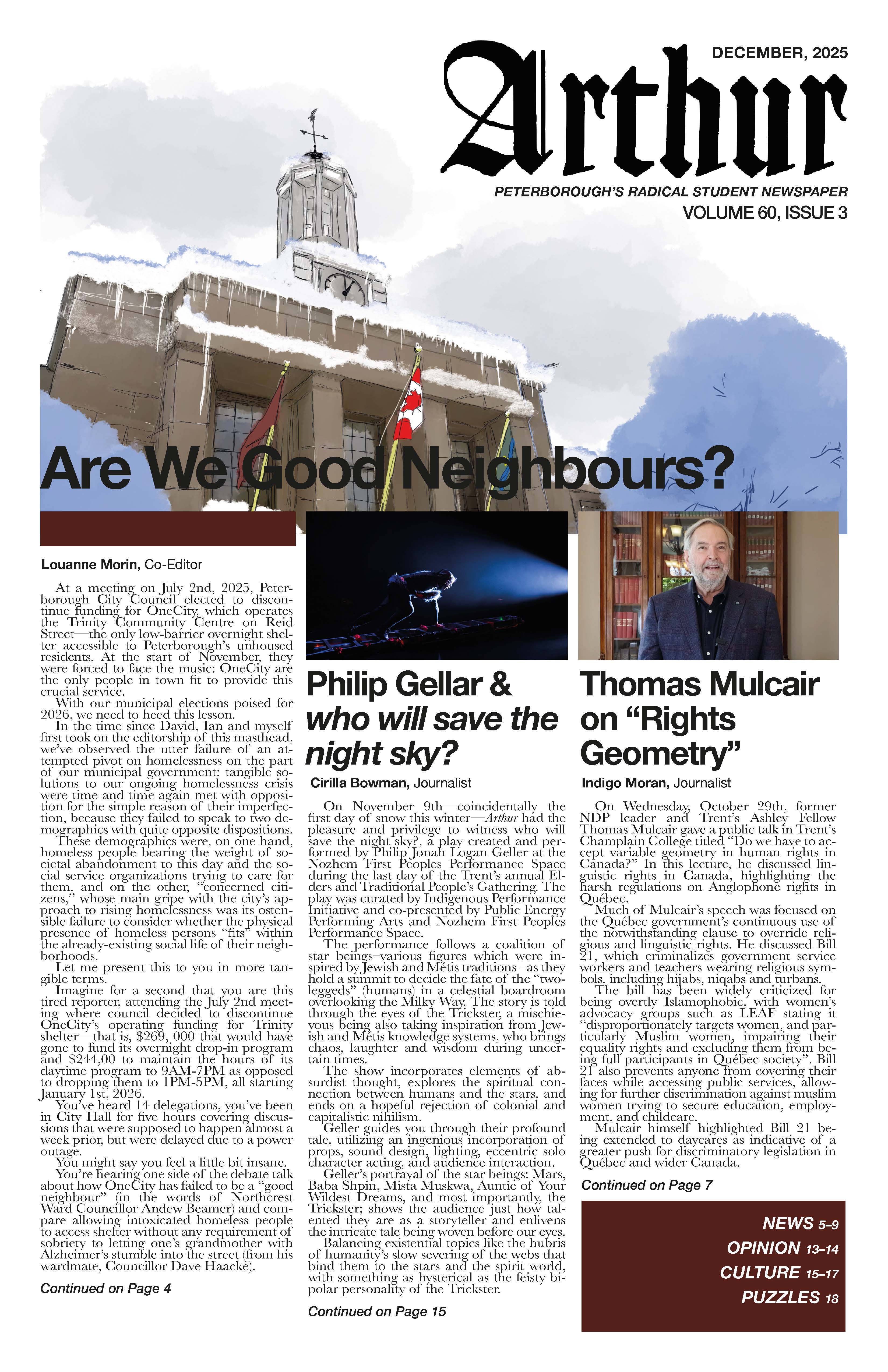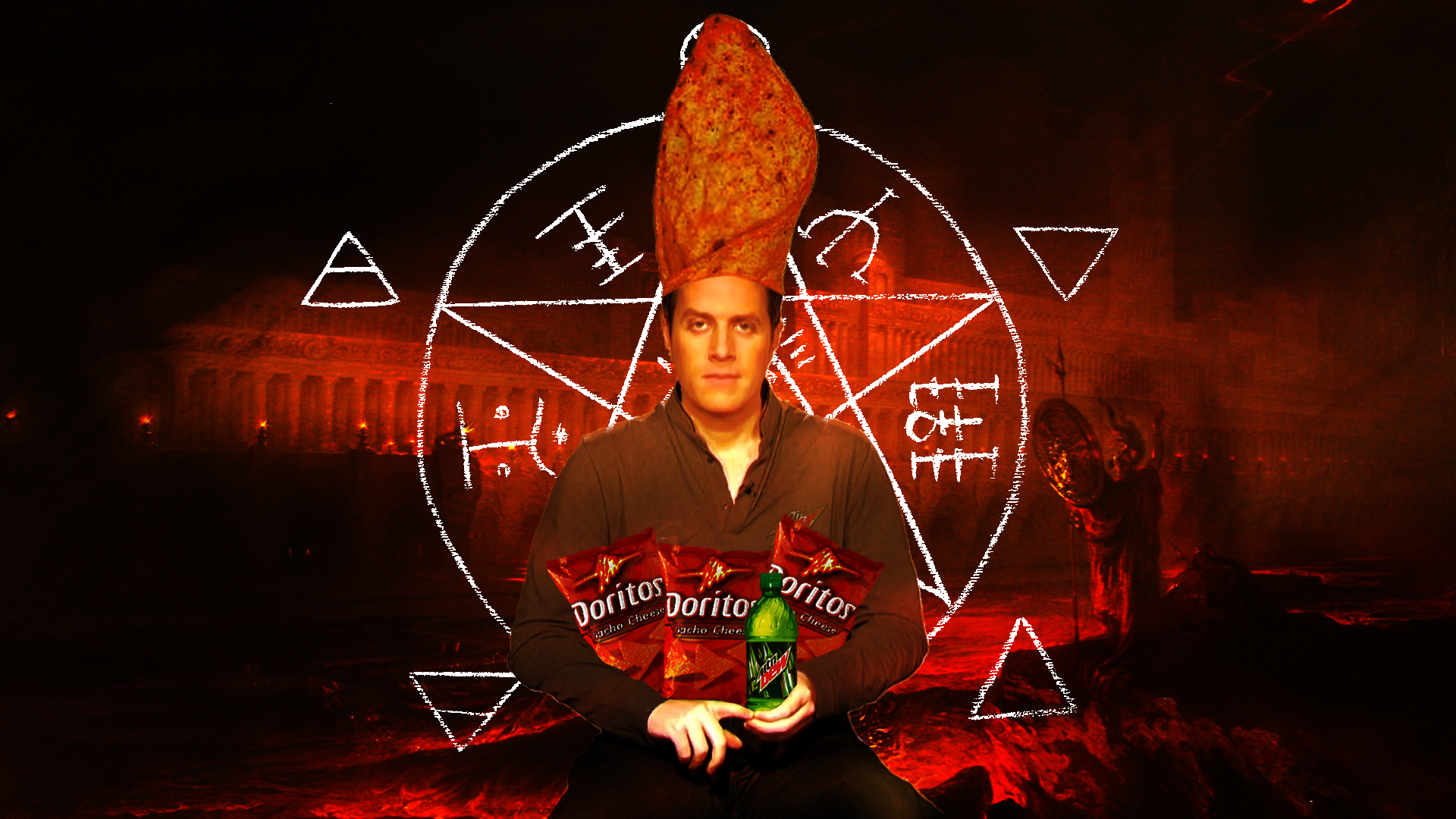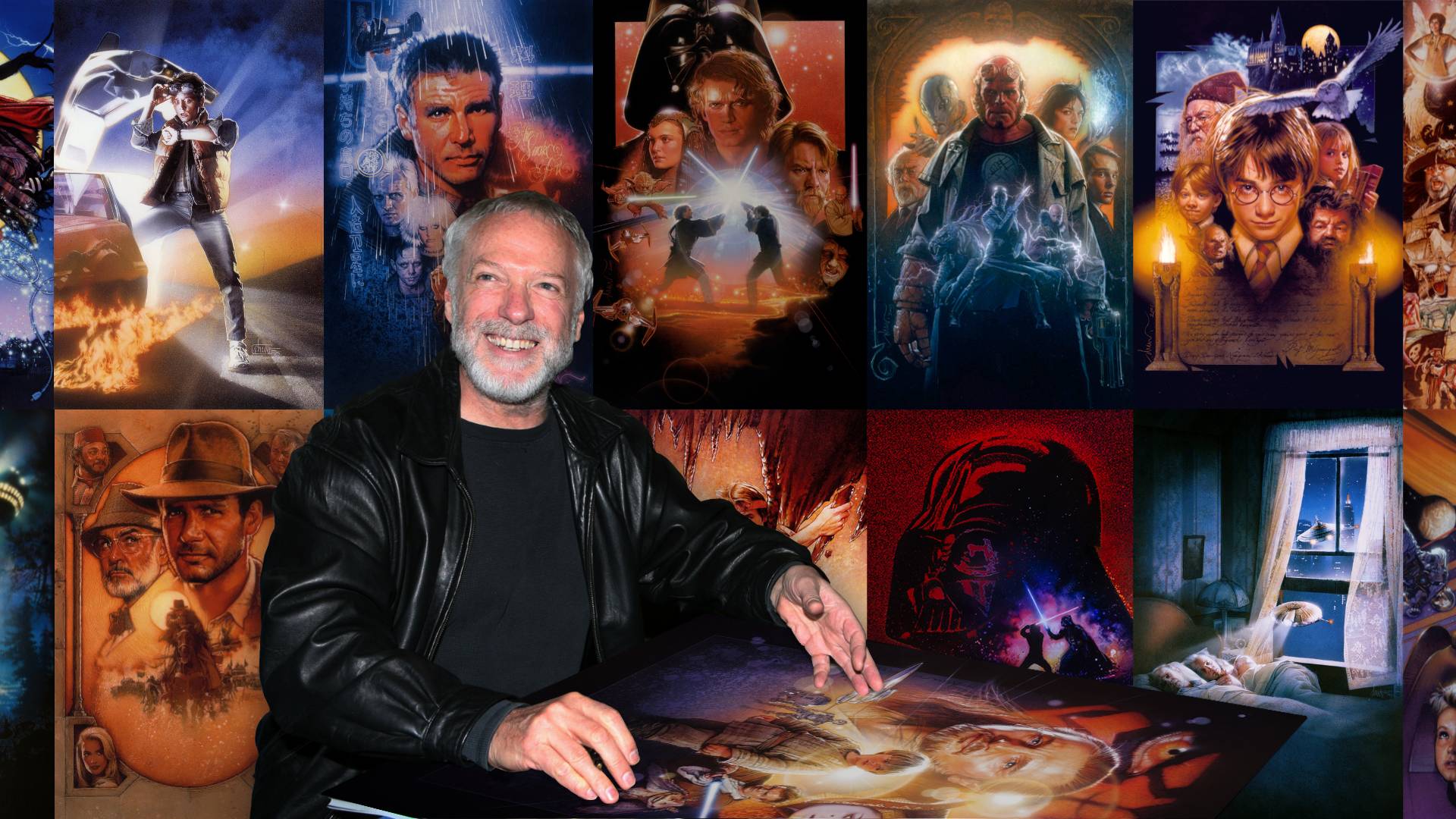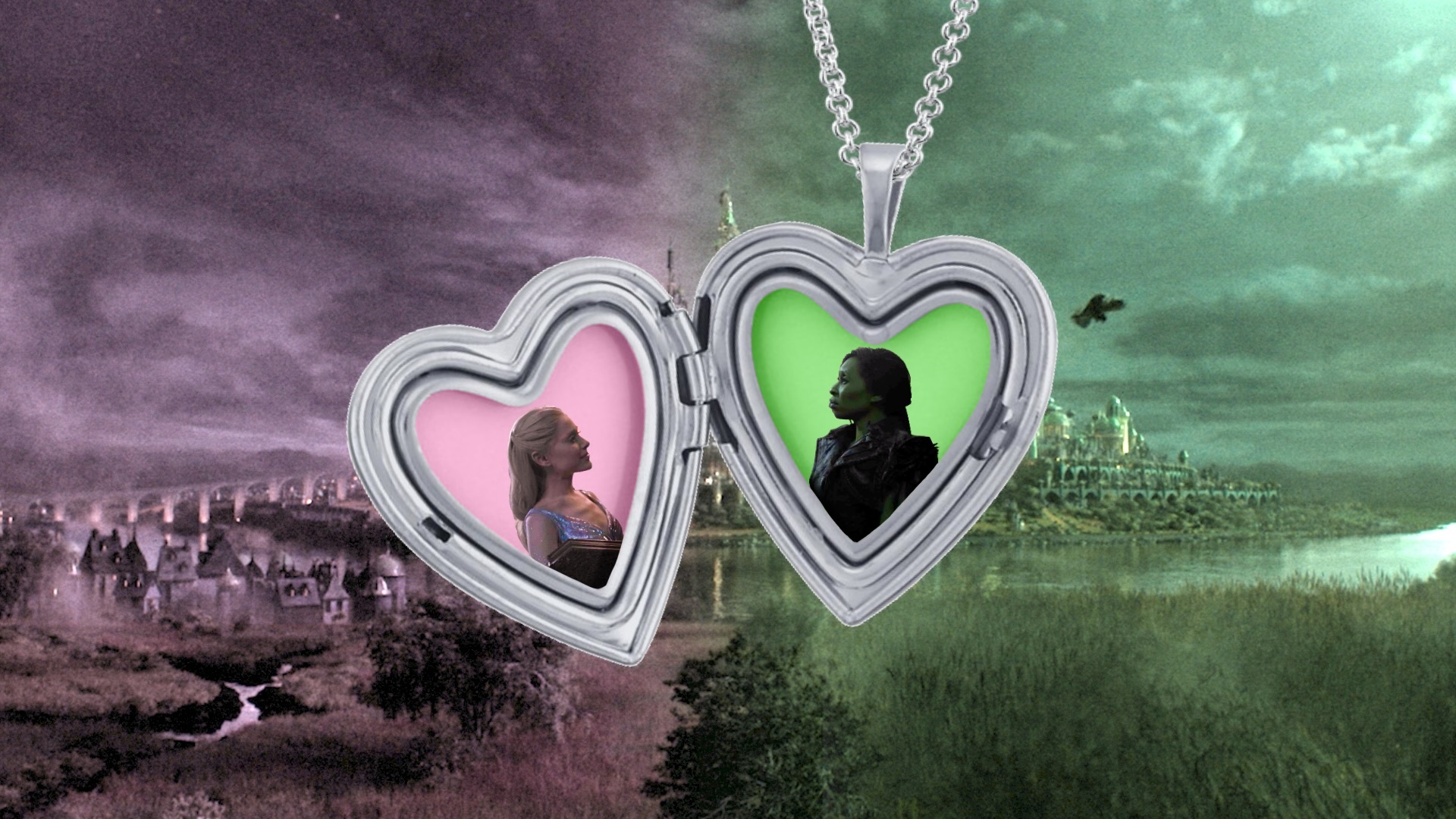You’re reading the Director’s Cut of this month’s Cinevangelism, a supplement to the version printed in Arthur Issue 5. In a continuation of my tradition for ever-deepening ironic bits, I’ve written two versions of this month’s column, the longer of which here takes the form of several hundred words of sob stories and soliloquizing.
Look upon it and weep.
If you’d like to see Eternal Sunshine of the Spotless Mind (2004) tackled from a more classically cynical and irreverent cinevangelical angle, be sure to check out the Theatrical Cut of this month’s Cinevangelism available for your religious consumption in Arthur Issue 5.
The first time a girl ever gave me her phone number was in a Wendy’s parking lot. She was the cashier at the Wendy’s in one of the hundreds of cookie-cutter towns that litter Ontario’s Provincial Highway 7. I was on my way to Scout camp.
At sixteen, I must’ve been one hell of a specimen to impress the girl central to this anecdote. Certainly, in few of my days of working retail did I ever experience emotion beyond resentment for my customers. Even then, I never had to serve someone a Baconator™. How superficial attraction can triumph over such hurdles is beyond me, though triumph it must have, nonetheless. It transpired like this: a woman a couple years older than me stopped me in the parking lot on my way out. She handed me a length of receipt paper.
“My co-worker wanted me to give this to you,” she told me.
Written on it was a phone number.
Many might not believe me given the (honestly not wholly inaccurate) pop-cultural typecasting and conventional derision cast upon those in the Scouting movement. I myself have long possessed an inability to emulate anything closely resembling hegemonic masculinity—a fact which well predated my membership of that most homosexually-reputed of outdoor youth groups. Still, I received remarkably regular attention from my erstwhile opposite sex; besides Scout camps, I’ve been overtly hit on at a plethora of stereotypically virginal venues despite my most outwardly faggy demeanour.
I’ve been asked out at every dance I went to during high school (I draw a distinction here between this and ‘high school dances,’ though that will have to wait for another column). I’ve been anywhere from flirted with to outright propositioned at more Model United Nations conferences than I can remember. At a 2017 Rainbow Youth Forum, several gay men gave me their phone numbers—much to the chagrin of my then-girlfriend. These most fleeting of interactions thus form the foundation of one of the most fundamental questions besides “why,” which we ask ourselves almost every day without fail: “what if?”
What if this had turned out completely differently?
2004’s Charlie Kaufman-written Eternal Sunshine of the Spotless Mind posits the opportunity to delete anyone from your memories forever. This is presented through the device of a medical treatment, lauded by those who peddle it as a benevolent service. A mercy, even. A cure for misery. This, in tragically pedestrian fashion, is unsurprisingly employed to exorcise the memory of a breakup, which in turn anchors itself at the centre of the film. Rather than live with all the ways we ourselves have fucked up our lives, Eternal Sunshine proposes absolution by means of forgetting.
Underpinning the entirety of Eternal Sunshine of the Spotless Mind is Jacques Derrida’s concept of “Hauntology” — that echoes of the cultural past create a future of our imaginations borne of dreaming of the ways things could have been, rather than the way they are. Perhaps the best way this has been described is as “nostalgia for lost futures”—something lost that was never had. How many times has this played out in the pursuit of romance?
Cleverly, Eternal Sunshine begins in media res after the protagonist, Joel (Jim Carrey), has already erased his memory of his ex-girlfriend, Clementine (Kate Winslet). Clementine erased Joel from her mind days prior without explanation, this event being the impetus for the memorial exorcism of his own. The film forecloses their relationship, then deigns to devote a considerable runtime to recounting it, anchoring the narrative in disconnected reminiscences. A certain irony lies in the fact that whilst the audience is experiencing Joel’s memories, he himself has already forgotten them. Before the movie begins the narrative has effectively ended, though our protagonist remains destabilized by it, haunted, nevertheless. What film better then to be the subject of a column devoted to my own mawkish recollections?
“What if this had turned out differently?” is something I ask myself incessantly. Ne’er a moment passes without me grieving the opportunities I feel I’ve lost. Myriad human interactions haunt us in this way, though perhaps none so to the degree as romantic relationships, or even the lack thereof, have tendency to. I sometimes think about the girls to whom I’ve barely spoken more than the ones whom I’ve dated for two years, simply because the abyssal depths of possibility yawn all the wider for having been left unfulfilled.
In his essay “an atlas of a specific luxury,” Tim Rogers writes that “nightingales have about as many words in their language as we do: two.” These respective expressions, he says, “are ‘I exist,’ and ‘so do I’.” Functionally, the act of “asking someone out” becomes akin to this mantra rephrased as a question: “do you think I exist?” In posing this question, one is guaranteed one of the possible outcomes—either they agree to “go out,” likely cementing the nascent courtship into true romantic union, or else they rebuke the offer and life goes on. Regardless of outcome, both prove affirming. Either way, the response to “do you think I exist?” is ultimately “yes,”. However, should one not pose the question—be it by choice or by circumstance—they are forever condemned to possess both outcomes, simultaneously. In the perpetuity of this Schrödinger-esque irresolution lies the enduring basis of this haunting. Without witnesses, how can I be sure I exist? The answer instead becomes “I might.”
At the end of the Fall 2022 semester, my classmates graciously invited me to a night at The Social Pub to celebrate the end of our shared misery in a workshop class. I liked the class, don’t get me wrong, but you try taking four workshops in one semester and coming out sane. In place of the final lecture—which had been forgone in the interests of sparing my professor the commute from Toronto—we convened at a classmate’s house, drank, and then ventured to The Social in the interests of drinking some more.
We checked our coats, and everyone ordered drinks. Most people got vodka coolers. I ordered a pint of Guinness. So, it transpired that, after two rounds of shots, I found myself racking 8-balls against my classmate and some guy I didn’t know who had somehow joined our party. With my ass very prominently situated as I leaned out over the table, a girl approached me from the dance floor and put a hand on my shoulder.
“I looooooooove your hair,” she drawled, meeting my eyes.
“Thanks,” I responded. Her gaze fell to my chest, and to my breasts, obviously visible through the sheer fabric of my top.
“You’re, like, really hot.”
I smiled. Maybe I even blushed. Finally, her eyes fell to my waist, finally settling on the pronounced outline of my cock visible through the fabric of my pantsuit. She opened her mouth, and asked:
“What are your pronouns?”
I gave her my phone number.
I wouldn’t share this anecdote had anything come of it.
The problem with finding ourselves each and every day the unwitting protagonists of our own personal, hellish, choose-your-own-adventure novels is that at the fork of each figurative demand to “turn to page ___,” we are instead left to contemplate the futures that could have been, but never were. Each decision here represents a future aborted—infinite possibility snuffed out with irrefutable certainty by our own hands. If the butterfly effect conspires once every syzygy to change our lives for the better, its consequence is that it renders us all the more painfully aware of our own culpability for its more cruel machinations. Like silver nitrate on celluloid, memory etches the impression of fleeting time so that it may dwell with us forever. When I call film a hauntological medium, this is what I mean. The processes of recording and reproduction possess a power like no other to suspend moments in perpetuity. What then, is this column if not a collection of ghost stories?
A professor of mine once described the collective works of Jean Paul-Sartre as “a philosophy of no excuses,”. This aphorism, whilst fanciful, in my mind bears some weight. Such is the sad reality of the freedom to which we are all condemned: moments, no matter their brevity, stay with us forever. Eternal Sunshine aims to prove that, if no one else, we are without excuses accountable to ourselves. To this end, memory proves the cruellest faculty of consciousness. No absolution, lest we forget.
The existentialists say that we are born alone; that we die alone, and ultimately we are alone throughout our life. What they fail to realize is that ghosts remain each of our most steadfast companions.
To some, this realization might well prove maddening. Ghosts, intangible as they are, don’t exactly make for great conversation. We can only learn to accept their companionship, or else try and run away. Eternal Sunshine tells us the latter is a hopeless endeavour. Still, I think there’s merit to learning to live with our phantasmal companions. Each one of them bears for us all the weight and consequence of every decision we have ever made. For years I lived in a haunted house so full of spirits that it drove me to the precipice of hysteria, right up until the day where I decided to transition, lest I take it upon myself to join them.
I added exactly one more phantom to my menagerie on the day I became a woman, but for the moment I think it better to let that story rest.
None of this is to say I live with fewer spectres than I did before. Rather, we’ve merely grown more tolerant of one another. Our conversations have grown more cordial, and at night their screams bother me considerably less. We are fated to walk side by side until such time as I become old and forgetful. This understanding no longer scares me as it once did. Once, I lamented that ghosts should serve as placeholders for people I myself failed to keep around. Nowadays, I’m just glad for the company.


.png)


.jpg)


.jpeg)



.jpg)


.jpg)

.jpg)







.png)